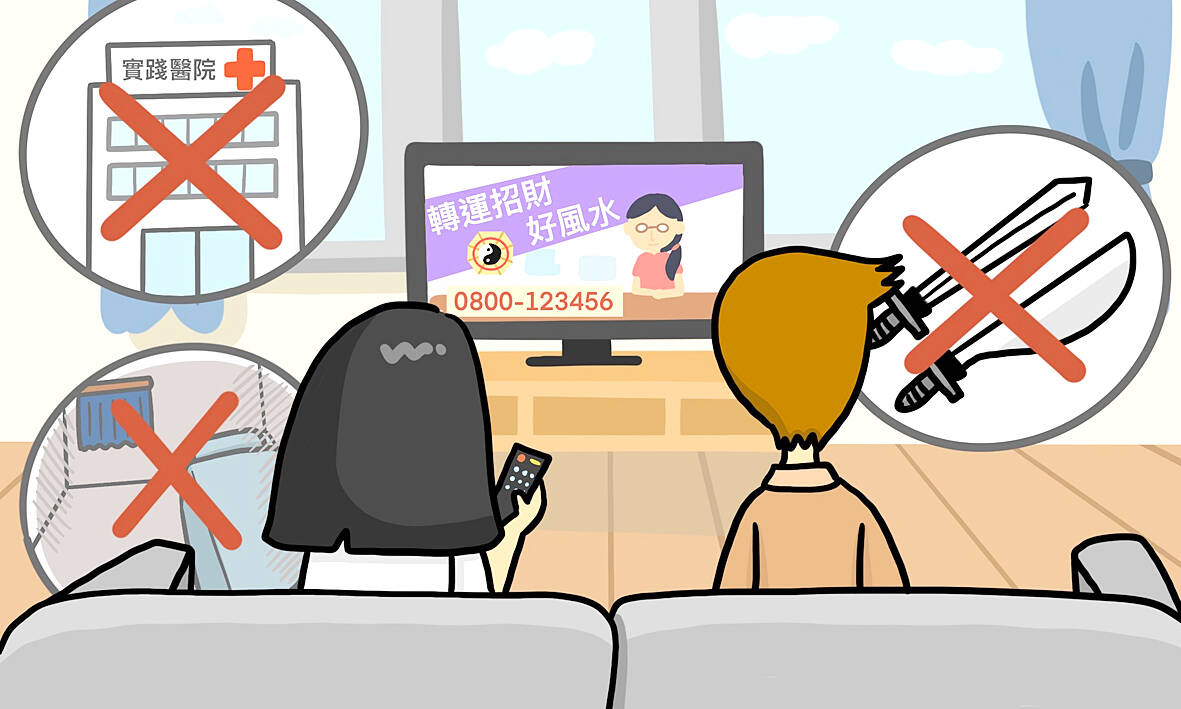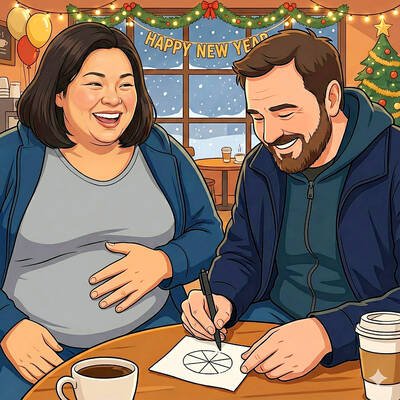對話 Dialogue
小實:馬克,你聽過「風水」嗎?

Xiǎoshí: Mǎkè, nǐ tīngguò fēng shuǐ ma?
馬克:我聽過,是臺灣人買房子的時候會注意的事情,對吧?
Mǎkè: Wǒ tīngguò, shì Táiwān rén mǎi fángzi de shíhòu huì zhùyì de shìqíng, duì ba?
小實:對啊,臺灣人相信居住的環境會影響人的個性和健康。
Xiǎoshí: Duì a, Táiwān rén xiāngxìn jūzhù de huánjìng huì yǐngxiǎng rén de gèxìng hàn jiànkāng.
馬克:我聽其他臺灣的朋友說,住在醫院附近容易生病,是嗎?
Mǎkè: Wǒ tīng qítā Táiwān de péngyǒu shuō, zhù zài yīyuàn fùjìn róngyì shēngbìng, shì ma?
小實:是啊,還有家裡的客廳的光線要足夠,太暗的話會影響運氣哦。
Xiǎoshí: Shì a, hái yǒu jiālǐ de kètīng de guāngxiàn yào zúgòu, tài àn dehuà huì yǐngxiǎng yùnqì ō.
馬克:這點我同意,要是陽光照不進客廳,確實可能會影響心情。
Mǎkè: Zhè diǎn wǒ tóngyì, yào shì yángguāng zhào bù jìn kètīng, quèshí kěnéng huì yǐngxiǎng xīnqíng.
小實:還有人說,家裡不適合放刀或劍,因為這些東西是武器。
Xiǎoshí: Hái yǒu rén shuō, jiālǐ bú shìhé fàng dāo huò jiàn, yīnwèi zhèxiē dōngxi shì wǔqì.
馬克:哇!看來「風水」要注意的事情很多耶。
Mǎkè: Wā! Kàn lái fēng shuǐ yào zhùyì de shìqíng hěn duō ye.
小實:對啊,有機會我也想好好研究一下。
Xiǎoshí: Duì a, yǒu jīhuì wǒ yě xiǎng hǎohǎo yánjiù yíxià.
翻譯 Translation
Xiaoshi: Mark, have you heard of Feng Shui?
Mark: Yes, I have. It’s something Taiwanese pay attention to when buying a house, right?
Xiaoshi: Yes, Taiwanese believe that the living environment can affect a person’s personality and health.
Mark: I heard from other Taiwanese friends that living near a
hospital makes it easy to get sick, is that true?
Xiaoshi: Yes, that’s right. Also, there should be sufficient lighting in the living room at home. If a room is too dark, it may affect your luck.
Mark: I agree with that. If sunlight can’t come into the living room, it can affect one’s mood.
Xiaoshi: Some people also say that you shouldn’t place knives or swords at home because they are considered weapons.
Mark: Wow! It seems like there are many things to pay attention to in Feng Shui.
Xiaoshi: Yes, you’re right. If I get the chance, I would like to study it thoroughly.
單字片語 Vocabulary
1. 風水 (fēngshuǐ) Feng Shui, geomancy
2. 相信 (xiāngxìn) believe
3. 居住 (jūzhù) live
4. 環境 (huánjìng) environment
5. 個性 (gèxìng) personality
6. 其他 (qítā) other
7. 光線 (guāngxiàn) the light
8. 足夠 (zúgòu) enough
9. 確實 (quèshí) really
10. 武器 (wǔqì) weapons
教材音檔 Audio Files
教材影片 Video Files:
https://www.instagram.com/celc.nou_tw/guide/_/17999106352646292/
實踐大學華語中心提供
By Shih Chien University Chinese Language Center: https://chineseusc.com/

詞法—不定詞的誤用 1. 我得記住星期五要把報告寫好。 ˇ I must remember to finish my report by Friday. χ I must remember finishing my report by Friday. 註︰remember 後面跟動名詞或不定詞表示兩種不同的概念,與 forget 相類似。 試比較下列句子: I remember meeting him somewhere.(我記得曾經在某處見過他。) I must remember to meet him at the station at six this evening. (我必須記住今晚六點得去車站接他。) He remembered turning off the light when he left the room. (他記得離開房間時曾先把燈熄了。) Remember to turn off the light when you leave the room. (記住離開房間時要把燈關了。) 2. 他提醒她做好她份內的事。 ˇ He reminded her to do her job. χ He reminded her of doing her job. 註︰remind ... of ... 後面跟動名詞,表示「使人想起做過某事」。若是「提醒某人應做某事」,應用 remind ... to do ...。試比較下列句子: He reminded me of my attending the lecture last Friday. (他讓我想起我上星期五去聽過那次演講。) He

★ Bilingual Story is a fictionalized account. 雙語故事部分內容純屬虛構。 “Any New Year’s resolutions?” he asked. Lena put her coffee down. “Yeah,” she said. “To get in shape.... round is a shape, right?” Mark chuckled. “I support this. Fully achievable. Low risk.” “Thanks,” she smiled and lovingly rubbed her round belly. “I like a resolution I can’t fail.” “Funny thing is, I was thinking about getting round too.” Lena nodded her head in approval, “You could put some meat on those skinny bones of yours.” Mark shook his head, “Not that kind of round. Wheel-of-Life round.” She raised an eyebrow.

對話 Dialogue 清清:最近天氣越來越冷,感覺很容易感冒,要不要一起去吃薑母鴨或是羊肉爐? Qīngqing: Zuìjìn tiānqì yuèláiyuè lěng, gǎnjué hěn róngyì gǎnmào, yào bú yào yìqǐ qù chī jiāngmǔyā huòshì yángròulú? 華華:最近我覺得有點累,想吃薑母鴨,可是又怕一下子吃太補會上火。 Huáhua: Zuìjìn wǒ juéde yǒudiǎn lèi, xiǎng chī jiāngmǔyā, kěshì yòu pà yíxiàzi chī tài bǔ huì shànghuǒ. 清清:那我們去喝香菇雞湯吧,不太容易上火,喝了也會很暖和。 Qīngqing: Nà wǒmen qù hē xiānggū jītāng ba, bú tài róngyì shànghuǒ, hē le yě huì hěn nuǎnhuo. 華華:聽起來不錯!你們家平常冬天都吃什麼進補? Huáhua: Tīng qǐlái búcuò! Nǐmen jiā píngcháng dōngtiān dōu chī shénme jìnbǔ? 清清:我家都煮麻油雞,吃完整個人手腳都會熱起來。我也很久沒喝香菇雞湯了,正好可以去打打牙祭。 Qīngqing: Wǒ jiā dōu zhǔ máyóujī, chī wán zhěnggè rén shǒujiǎo dōu huì rè qǐlái. Wǒ yě hěn jiǔ méi hē xiānggū jītāng le, zhènghǎo kěyǐ qù dǎ dǎ yájì. 華華:可是我最近在減肥,會不會吃得太補,肉又長回來了? Huáhua: Kěshì wǒ zuìjìn zài jiǎnféi, huì bú

A: Apart from Taiwan’s A-mei, Mayday and Jolin Tsai, there are many foreign singers coming to Taiwan early this year. B: The South Korean girl group Babymonster are playing two shows at Taipei Arena starting from tonight. Who else is coming to Taiwan? A: Other artists include Australian band Air Supply, K-pop superstar Rain, boy group Super Junior, TXT, US singers Giveon and Josh Groban, and Irish boy group Westlife. B: Air Supply was the first foreign band to come to Taiwan in 1983, and they’re probably the most frequently visiting group too. A: As the year is beginning